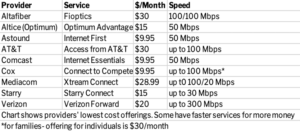KIC IS MADE POSSIBLE WITH ASSISTANCE FROM THE BENTON INSTITUTE FOR BROADBAND & SOCIETY.
[email protected]
[email protected]

The following information is for reference purposes only. The Keystone Internet Coalition does not take a position on its accuracy or value to policymakers.
There are no updates this month.
There are no updates this month.
There are no updates this month.
There are no updates this month.
There are no updates this month.
There are no updates this month.
There are no updates this month.
There are no updates this month.
There are no updates this month.
There are no updates this month.
There are no updates this month.
There are no updates this month.
There are no updates this month.
There are no updates this month.
There are no updates this month.
These are all great ideas but not nearly as beneficial as getting broadband directly into every home. “The gap in digital skills between students with no home access or cell phone only and those with fast or slow home internet access is equivalent to the gap in digital skills between 8th and 12th grade students.”
There are no updates this month.
There are no updates this month.
There are no updates this month.
National cellular carriers, text providers, and wireline providers other than rural incumbent local exchange carriers (RLECs) will have six months to implement a valid request from s State 911 Authority. Small telcos, non-nationwide CMRS providers, and Internet-based TRS providers will have one year to implement a valid request to change.
Missouri is working hard on this transition and over half the counties have received grant funds for the cost.
The legal battle reflects ongoing tensions between state and federal authorities over the regulation of broadband services.
Providers are thinking about this this and will probably have to address it in the future.
FINAL SUMMARY – the long list of big improvements that were promised by 5G never materialized. That being said, these national statistics will vary by market. It is also likely that the performance of these two technologies differs during the day as the load on the networks ebbs and flows. But the Ookla statistics show that, overall, there is better performance on 5G
There are no updates this month.
This Act is a way to get defaulted money back into action much faster than waiting for federal agencies to launch a replacement grant program. It is expected that this legislation will take bi-partisan support and sponsorship to get traction but what a great idea!
There are no updates this month.
There are no updates this month.

No updates.
No updates.
No updates.
These two states have very different priorities and scoring criteria. It will be interesting to see what NTIA is going to be willing to approve.
To put these numbers in perspective, in the 3rd quarter of 2023, the average US household used 54.7 gigabytes of data than one year earlier which is a lot of usage in a month. With roughly 120 million residential broadband subscribers this equates to over 6.5 billion more gigabytes of data used each month than just a year ago. That is 11% more usage hitting the internet backbone, just from residential usage.